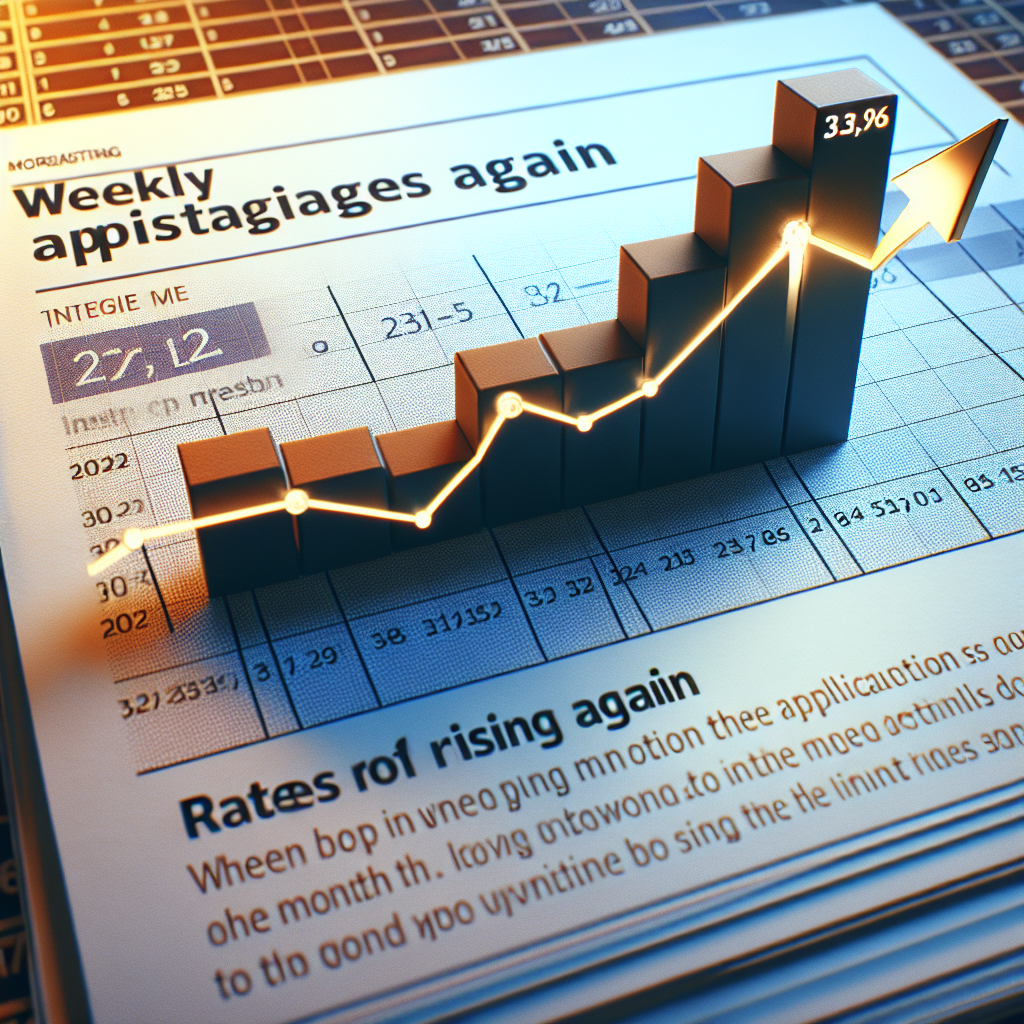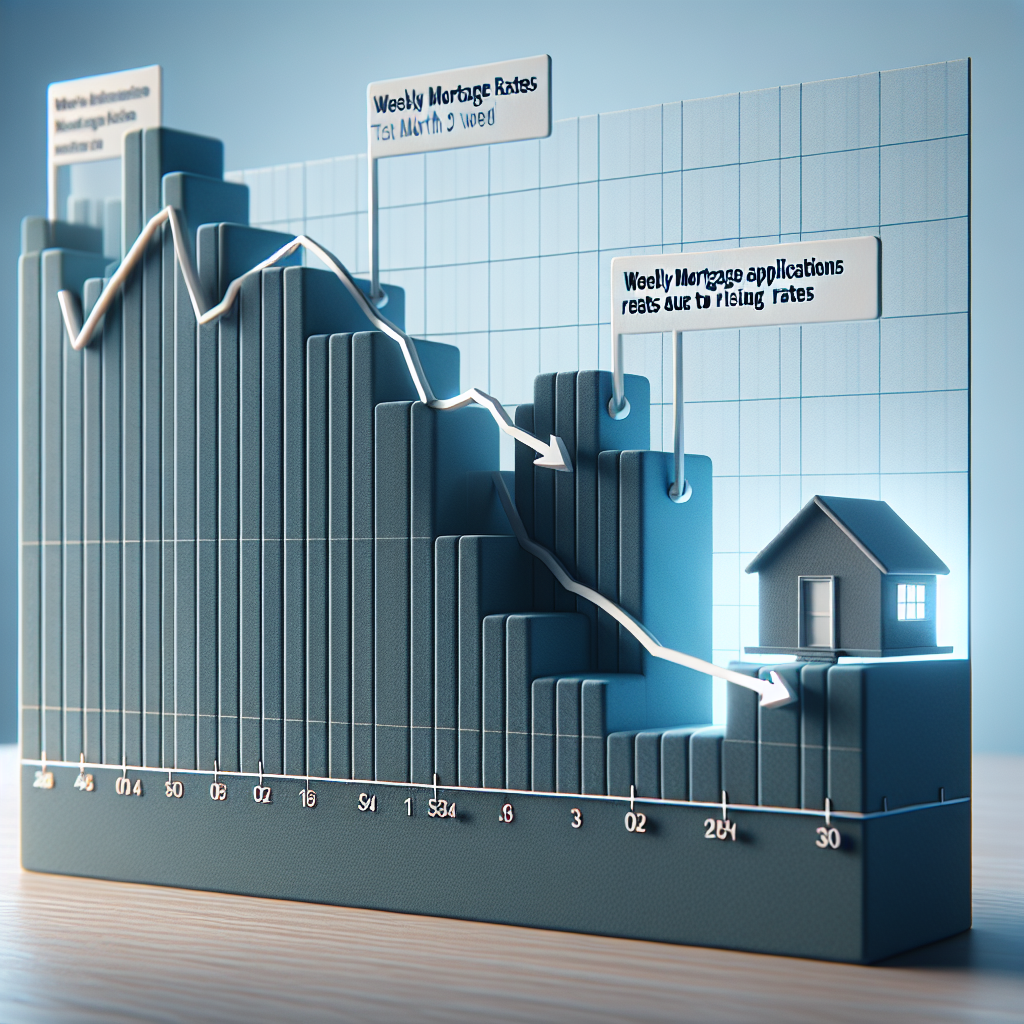-
Table of Contents
- Weekly Mortgage Applications Hit Three-Month Low as Rates Rise Again
- Understanding the Decline in Mortgage Applications
- Rising Interest Rates: The Primary Culprit
- The Impact on Homebuyers
- Case Study: The Smith Family
- Broader Economic Implications
- Statistics and Trends
- Future Outlook
- Potential Scenarios
- Strategies for Homebuyers
- Case Study: The Johnsons
- Conclusion
Weekly Mortgage Applications Hit Three-Month Low as Rates Rise Again

The mortgage market is experiencing a significant shift as weekly mortgage applications hit a three-month low, driven by rising interest rates. This trend has far-reaching implications for potential homebuyers, the housing market, and the broader economy. In this article, we will delve into the factors contributing to this decline, analyze the impact of rising rates, and explore potential future scenarios.
Understanding the Decline in Mortgage Applications
Mortgage applications are a key indicator of the housing market’s health. A decline in applications can signal a cooling market, which can have ripple effects throughout the economy. Several factors contribute to the recent drop in mortgage applications:
- Rising Interest Rates: The most significant factor is the increase in mortgage rates. Higher rates make borrowing more expensive, discouraging potential buyers from applying for mortgages.
- Economic Uncertainty: Economic factors such as inflation, employment rates, and consumer confidence also play a role. Uncertainty can lead to hesitation among potential homebuyers.
- Housing Supply and Prices: Limited housing supply and high home prices can deter buyers, especially first-time homebuyers who may struggle to afford a home in a competitive market.
Rising Interest Rates: The Primary Culprit
Interest rates have been on an upward trajectory, driven by various economic factors. The Federal Reserve’s monetary policy, aimed at curbing inflation, has led to higher borrowing costs. As a result, mortgage rates have risen, making home loans more expensive for consumers.
According to the Mortgage Bankers Association (MBA), the average contract interest rate for 30-year fixed-rate mortgages increased to 3.25% in the latest week, up from 3.15% the previous week. This increase has a direct impact on monthly mortgage payments, making homeownership less affordable for many.
The Impact on Homebuyers
The rise in mortgage rates has several implications for potential homebuyers:
- Reduced Purchasing Power: Higher interest rates mean higher monthly payments, reducing the amount buyers can afford to borrow. This can limit their options and force them to consider less expensive homes.
- Increased Competition: With fewer buyers able to afford homes, competition for available properties may decrease. However, this could also lead to a slowdown in home price appreciation.
- First-Time Homebuyers: First-time buyers are particularly vulnerable to rising rates. Many are already stretching their budgets to enter the housing market, and higher rates can push homeownership out of reach.
Case Study: The Smith Family
Consider the Smith family, who have been saving for years to buy their first home. They had budgeted for a $300,000 home with a 3% interest rate, resulting in a monthly payment of approximately $1,265. With the recent rate increase to 3.25%, their monthly payment would rise to around $1,305. While this may seem like a small difference, it can significantly impact their budget over the life of the loan.
Broader Economic Implications
The decline in mortgage applications and rising interest rates have broader economic implications:
- Housing Market Slowdown: A decrease in mortgage applications can lead to a slowdown in home sales, affecting real estate agents, builders, and related industries.
- Consumer Spending: Homebuyers often spend on home improvements, furniture, and appliances. A slowdown in home purchases can reduce consumer spending in these areas.
- Economic Growth: The housing market is a significant driver of economic growth. A slowdown can impact GDP growth and overall economic health.
Statistics and Trends
Recent data from the MBA highlights the current trends in the mortgage market:
- Mortgage applications decreased by 6.5% in the latest week, marking the third consecutive weekly decline.
- Refinance applications, which are highly sensitive to interest rate changes, fell by 8% compared to the previous week.
- Purchase applications dropped by 4%, indicating a slowdown in homebuying activity.
Future Outlook
The future of the mortgage market will depend on several factors:
- Federal Reserve Policy: The Federal Reserve’s actions on interest rates will continue to influence mortgage rates. If the Fed continues to raise rates to combat inflation, mortgage rates may rise further.
- Economic Conditions: Economic indicators such as employment rates, inflation, and consumer confidence will play a role in shaping the housing market.
- Housing Supply: Addressing the housing supply shortage is crucial. Increased construction and availability of homes can help balance the market and make homeownership more accessible.
Potential Scenarios
Several scenarios could unfold in the coming months:
- Continued Rate Increases: If rates continue to rise, we may see a prolonged slowdown in mortgage applications and home sales. This could lead to a cooling housing market and slower home price appreciation.
- Stabilization of Rates: If rates stabilize, the market may adjust, and buyers could regain confidence. This could lead to a gradual recovery in mortgage applications and home sales.
- Economic Improvement: If economic conditions improve, with higher employment rates and consumer confidence, the housing market could see renewed activity despite higher rates.
Strategies for Homebuyers
For potential homebuyers navigating this challenging market, several strategies can help:
- Lock in Rates: Consider locking in mortgage rates to protect against future increases. This can provide peace of mind and budget certainty.
- Explore Different Loan Options: Investigate various loan options, such as adjustable-rate mortgages (ARMs) or government-backed loans, which may offer more favorable terms.
- Improve Credit Scores: A higher credit score can help secure better mortgage rates. Focus on improving credit scores by paying down debt and making timely payments.
- Save for a Larger Down Payment: A larger down payment can reduce the loan amount and potentially lower monthly payments, making homeownership more affordable.
Case Study: The Johnsons
The Johnson family, who are also first-time homebuyers, decided to lock in their mortgage rate when they saw rates starting to rise. By doing so, they secured a 3.15% rate, which saved them money compared to waiting and facing higher rates. They also explored different loan options and found a government-backed loan that offered favorable terms, making their dream of homeownership a reality.
Conclusion
The recent decline in weekly mortgage applications, driven by rising interest rates, highlights the challenges facing the housing market and potential homebuyers. As rates continue to rise, affordability becomes a significant concern, particularly for first-time buyers. The broader economic implications of a cooling housing market can impact various sectors and overall economic growth.
Looking ahead, the future of the mortgage market will depend on factors such as Federal Reserve policy, economic conditions, and housing supply. Potential homebuyers can navigate this challenging environment by employing strategies such as locking in rates, exploring different loan options, improving credit scores, and saving for larger down payments.
Ultimately, understanding the factors driving the decline in mortgage applications and the impact of rising rates can help individuals and policymakers make informed decisions in this evolving landscape. As the market continues to adjust, staying informed and proactive will be key to successfully navigating the challenges and opportunities ahead.








